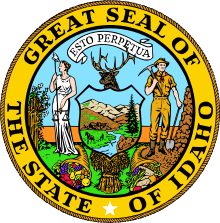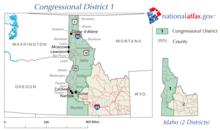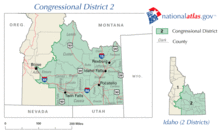United States House of Representatives elections in Idaho, 2008
| Elections in Idaho | ||||||||
|---|---|---|---|---|---|---|---|---|
 | ||||||||
|
||||||||
|
||||||||
The 2008 congressional elections in Idaho were held on November 4, 2008 to determine who would represent the state of Idaho in the United States House of Representatives, coinciding with the presidential and senatorial elections. Representatives are elected for two-year terms; those elected will serve in the 111th Congress from January 3, 2009 until January 3, 2011.
Idaho has two seats in the House, apportioned according to the 2000 United States Census. Representatives are elected for two-year terms. Its 2007-2008 congressional delegation consisted of two Republicans. In the 2008 elections, District 1 was won by Democrat Walt Minnick, so Idaho's delegation to the 111th Congress consists of one Republican and one Democrat. CQ Politics had forecasted District 1 to be at some risk for the incumbent party.
The statewide primary elections were held May 27, 2008.[1]
Overview
| United States House of Representatives elections in Idaho, 2008 | ||||||
|---|---|---|---|---|---|---|
| Party | Votes | Percentage | Seats Before | Seats After | +/– | |
| Republican | 377,464 | 59.23% | 2 | 1 | -1 | |
| Democratic | 259,776 | 40.77% | 0 | 1 | +1 | |
| Others | 0 | 0.0% | 0 | 0 | 0 | |
| Valid votes | - | -% | ||||
| Invalid or blank votes | - | -% | ||||
| Totals | 637,240 | 100.00% | 2 | 2 | — | |
| Voter turnout | -% | |||||
Match-up summary
| District | Incumbent | 2008 Status | Democratic | Republican | Other Party |
|---|---|---|---|---|---|
| 1 | Bill Sali | Re-election | Walt Minnick | Bill Sali | |
| 2 | Mike Simpson | Re-election | Debbie Holmes | Mike Simpson |
District 1

This district includes most of the Boise metropolitan area and northern Idaho, including all of the Idaho Panhandle. Major cities in the district include Nampa, Meridian, Coeur d'Alene, Lewiston as well as precincts in western Boise. Usually a Republican stronghold, in 2006 Bill Sali (campaign website) won an open seat race with only 50 percent of the vote over Larry Grant's 45 percent.
In 2008 Sali faced Walt Minnick (campaign website), the Democratic 1996 U. S. Senate nominee. Grant announced his intention to run for the seat again, but withdrew from the race before the primary and endorsed Minnick instead. Sali defeated Iraq war veteran Matt Salisbury with 60 percent of the vote in the May 27 Republican primary. Minnick won the Democratic nomination unopposed.[1]
Initially, Sali was expected to have a fairly easy path to victory in this heavily Republican district (CPVI R+19), and the race was initially rated 'Safe Republican' by the non-partisan Cook Political Report. However, the race became one of the more competitive in the country. According to the Wall Street Journal, a combination of poor fund raising (Sali trailed Minnick by nearly $200,000 according to reports in May) and Sali's combative reputation gave Minnick a chance to upset Sali despite the district's conservative majority. Many moderates who would have normally leaned Republican were reportedly concerned by Sali's far-right social views in a state where conservative voters have historically cared more about small government issues than social issues.[2]
As a result, the Cook Political Report adjusted its rating for the race throughout the campaign, moving it to 'Likely Republican' on July 3, 'Leans Republican' on September 18, and 'Republican Toss Up' on October 23.[3][4][5] CQ Politics forecasted the race as 'Republican Favored', but changed its rating to 'No Clear Favorite' late in the campaign. The Rothenberg Report rated it as 'Lean Republican'.[6]
- Race ranking and details from CQ Politics
- Campaign contributions from OpenSecrets.org
- 2008 Idaho CD-01 graph of collected polls at Pollster.com
Results
Walt Minnick defeated incumbent Bill Sali by slightly over 4,000 votes. Minnick's victory marks the first Congressional victory for the Democratic Party in Idaho since Larry LaRocco was defeated in 1994; he is only the second Democrat to hold the seat in the last four decades.[7] District 1 is the third most Republican district in the country (according to CPVI, as calculated using the 2004 and 2008 elections) to be represented by a Democrat in the 111th Congress.
| Party | Candidate | Votes | % | |||
|---|---|---|---|---|---|---|
| Democratic | Walt Minnick | 175,898 | 50.6 | |||
| Republican | Bill Sali (incumbent) | 171,687 | 49.4 | |||
| Total votes | 347,585 | 100.00 | ||||
| Democratic gain from Republican | ||||||
District 2

This district includes the Eastern Idaho and Magic Valley regions of Idaho, including the cities of Pocatello, Idaho Falls and Twin Falls, as well as parts of Boise on its western edge. The seat was first won by Republican incumbent Mike Simpson in 1998.
Simpson (campaign website) ran for reelection against Democratic nominee Deborah Holmes (campaign website), a first-time candidate for public office. Both Simpson and Holmes decisively won their respective primaries.[1] Although parts of the district have trended Democratic in recent years, including Blaine County, Teton County and the Boise precincts located in the district, a strong Mormon voting bloc has kept the district in Republican hands. CQ Politics forecasts the race as 'Safe Republican'.
Results
Mike Simpson easily won reelection over Deborah Holmes, receiving 71 percent of the vote.
| Party | Candidate | Votes | % | |
|---|---|---|---|---|
| Republican | Mike Simpson (incumbent) | 205,777 | 71.0 | |
| Democratic | Deborah Holmes | 83,878 | 29.0 | |
| Total votes | 289,655 | 100.00 | ||
| Republican hold | ||||
References
- 1 2 3 "May 27, 2008 Primary Election Results". Idaho Secretary of State. Archived from the original on April 16, 2009. Retrieved 7 March 2009.
- ↑ Scheck, Justin (15 July 2008). "Idaho Is No Longer a Lock for Republicans". The Wall Street Journal. p. A.3.
- ↑ "2008 Competitive Race Chart - July 3, 2008". Cook Political Report. 3 July 2008. Retrieved 7 March 2009.
- ↑ "2008 Competitive Race Chart - September 18, 2008". Cook Political Report. 18 September 2008. Retrieved 7 March 2009.
- ↑ "2008 Competitive Race Chart - October 23, 2008". Cook Political Report. 23 October 2008. Retrieved 7 March 2009.
- ↑ 2008 House Ratings Rothenberg Report, September 30, 2008
- ↑ "IDAHO: McCain". The New York Times. 6 November 2008. p. 12. Retrieved 7 March 2009.
- 1 2 "November 4, 2008 General Election Results". Idaho Secretary of State. Retrieved 7 March 2009.
External links
- Elections, Campaign Disclosure and Lobbyists from the Idaho Secretary of State
- U.S. Congress candidates for Idaho at Project Vote Smart
- Idaho U.S. House Races from 2008 Race Tracker
- Campaign contributions for Idaho congressional races from OpenSecrets.org